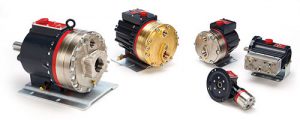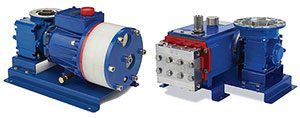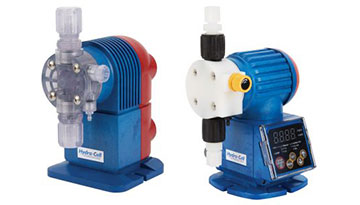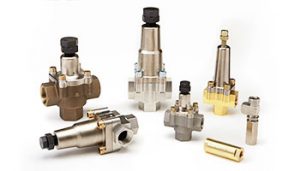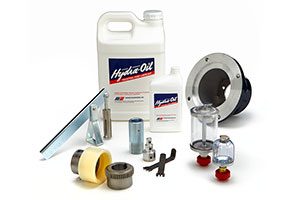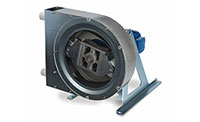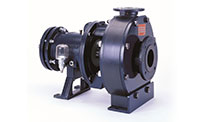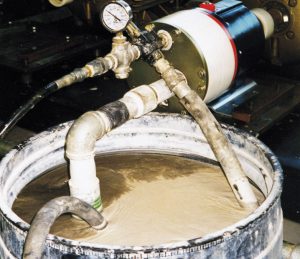Abrasive Liquids
Hydra-Cell abrasive pumps have been successfully applied in a wide variety of applications and industries.
Here are the applications utilizing abrasive pumps described below.
Pumping Bentonite Slurry in Horizontal Boring Applications for Service Utilities
An OEM manufactures equipment used to bore horizontal holes for service utilities under highways, railways, rivers, canals etc. In this boring operation, a jet flush of a fresh water stabilizing slurry is used, which has Bentonite as its main ingredient. The slurry contains particles, of which 95% are larger than 90 micron. Hydra-Cell abrasive pumps were selected because of their ability to pump abrasive materials, and for their smooth delivery. Piston pumps in the same application would provide only hours of life.
Pumping Adhesives in Industrial and Commercial Operations
Pumping adhesives is a common problem for many industrial and commercial operations. One example is supplying a remoistenable adhesive to a multitude of labels, stamps, and just about anything that sticks when you lick it. Originally, the manufacturer installed an air operated diaphragm pump, but it proved to be too small and unreliable for the precise quantities of adhesive metered onto the paper during production. With regular oil changes every six months, and an occasional cleaning, the Hydra-Cell abrasive pump has metered the adhesive with great repeatability and reliability. And, now with the standard "high flow" fluid end design, there is even smoother processing through the abrasive pump head.
Pumping Alumina Slurry and Deionized Water in a Porcelain Plant
This application requires an abrasive pump to deliver Alumina Slurry and Deionized Water into a Spray Dryer. The slurry is 70% solids (80 - 90% of which are Alumina). An air operated diaphragm pump was being used, but unsatisfactorily. The uneven flow (which is characteristic of AOD pumps) and the pressure fluctuations from the air compressor kicking in and out were unacceptable. Stalling was an additional problem. The solution was a Hydra-Cell abrasive pump with ceramic valves and seats. The abrasive pump is connected and controlled by a variable speed drive and temperature sensitive control at the dryer discharge. If the temperature rises, the abrasive pumps speed up to produce more material to cool down the dryer. The abrasive pump slows if the temperature decreases. An accurate positive displacement abrasive pump was necessary.
Pumping Concrete
Throughout the United States there are thousands of abandoned oil and gas wells (some exceed 3600 feet deep) that require plugging. The process first requires removing the well casing pipe. Then, cement (no aggregate) is mixed on site and pumped down the hole to fill certain segments that tap the oil and/or natural gas. A typical well plugging may consume 60 - 100 bags of cement. The advantage of using the Hydra-Cell abrasive pump and a portable cement mixer, is eliminating the need to bring in a large concrete truck. Using a standard pick-up truck with a hydraulic lift, the operator can lower the Hydra-Cell D40 abrasive pump skid to the ground, mix the cement (approximately 8-10 Ibs. to l gal. water or 1 kg to 1 liter) in a plastic tank that can provide 1-2 feet suction head. The Hydra-Cell D40 abrasive pump driven by a hydraulic motor delivers a steady flow down the well. Over a six -month period, one D40 abrasive pump has pumped over 5000 bags of cement without any service.
Pumping Glass Slurry
An electronic glass frit/powders manufacturer; pumps lead ground glass in a slurry form to a catalyst tank that is cooled with nitrogen. The cooled product is formed into a tube 1/8" in diameter and 3/8" long. This is sold as raw glass. The raw glass is eventually melted and fused around diodes and other electronic components. The problem they experienced was short pump life because rotors and stators wore out rapidly (60 hours) .The sealless design of the Hydra-Cell abrasive duty pump with ceramic valves and seats offered a successful solution. Viox increased productivity and quality eliminating down time and increased pressure capabilities.
Hydra-Cell® Abrasive Pump Advantages
- The seal-less nature of the Hydra-Cell abrasive pumps enable charged and dirty liquids to be processed without need for fine filtration to protect the abrasive pump.
- The Hydra-Cell abrasive pumps need little maintenance and can operate at continuous duty at high pressure.
- Pulsation is low, so dampeners may not be required for most Hydra-Cell® abrasive pumps.
- Hydra-Cell® abrasive pumps can handle solids up to 500 microns, or more. They can be pumped without fine filtration. System costs are reduced and maintenance is simplified.
- Most abrasive pumps in the Hydra-Cell® abrasive pumps range can operate at any pressure from <1 bar up to at least 70 bar. Some models up to 170 bar.
- Seal-less design distinguishes the Hydra-Cell® abrasive pumps from other abrasive pumps and is the basis of its long service life - many of the liquids pumped are harmful to pump seals. The Hydra-Cell® abrasive pumps are tolerant of small solids, resistant to chemical and corrosive attack.
- Energy savings. Compact and highly efficient (80-85%), a Hydra-Cell® abrasive pumps can be fitted with a smaller motor than would be required by many much bigger hot water pumps for equivalent flows and pressures.
Hydra-Cell® Abrasive Pump Selection Guide
Pumping Iron Oxide Slurry
A manufacturer of magnets used progressing cavity pumps for processing iron oxide slurry (heavy, abrasive and a viscosity similar to a thick milkshake) used in magnet production. The slurry was difficult to pump. The progressive cavity pumps did not provide adequate service life (sometimes less than a week). The costs for replacing worn stators, rotors, and seals were escalating as well as lost production time and lost man-hours doing repairs. The flow required was 10 GPM (38 l./min) at 325 PSI (23 bar). A Hydra-Cell abrasive pump model D35 was selected with ceramic valves and seats and Buna N-XS diaphragms. To control this heavy flow, a 10 HP motor, 1200 RPM inverter duty motor was installed with a matching variable frequency drive. The Hydra-Cell abrasive pump operated smoothly for 2500 hours before a new fluid end kit was installed.
Pumping Polishing Media for Eyeglass Lenses
Critical to the manufacturing process of polycarbonate eyeglass lenses is the spraying of polishing media onto the lenses, and then re-circulating this extremely abrasive media. The particle size in the polishing media was nominally less than 5 micron and the initial pressure recommended by the polishing equipment manufacturer was quite low. The OEM of the polishing equipment supplied plunger pumps that were lasting less than 2 weeks in real life application. Throughout the process, small particles of polycarbonate were being polished off the lenses and entering the recirculation stream. These particles proved to be fatal for the already laboring plunger pumps. The sealless design of the Hydra-Cell abrasive pump would greatly reduce the frequent failures experienced by the plunger pumps. Dirty fluids, abrasive fluids, reclaim, recycle, - no problem. Although the OEM of the polishing equipment did not recommend high pressure, the polishing process could benefit from increasing the pressure, and the sealless, smooth delivery of the Hydra-Cell® abrasive pump.
Pumping Resin in Paper Production
In the production of toilet paper (or the other tissue paper) the paper pulp must be dried before it can be put onto rolls. As the tissue moves along in the manufacturing process it is pulled across a rotating drum dryer (Yankee Dryer) or series of driers. To stop the drying paper from sticking to the dryer, a resin product called PVA is sprayed on the dryer by a Hydra-Cell abrasive pump. The tissue is removed from the dryer by a creeping "doctor" blade. The Hydra-Cell abrasive pump was selected for its ability to handle the resin with ease while other pumps (gear and lobe) had their seals damaged and air operated diaphragms pulsed too much.
Pumping Roofing Tar
A roofing company has a fleet of 6 trucks equipped with Hydra-Cell abrasive pumps for supplying roof tar emulsion to tops of buildings. This emulsion has the consistency of Jell-O pudding and flows steadily from an elevated tank. The positive displacement delivery is a real plus as discharge pressure varies with building height and hose length. All 6 abrasive pumps have been running smoothly for 4 years. As long as they receive a thorough water flush, repairs have been limited to oil changes and an annual fluid end kit.
Pumping Water for Pipeline Pressure Testing
This application requires pumping water to identify cracks in pipelines for city water supply lines. The Hydra-Cell abrasive pump was selected because previous pumps used required continuous maintenance. The water supplied is generally taken from local streams, rivers and lakes which tends to be slightly abrasive, therefore, causing premature failure of cups, packings and seals for pumps other than the Hydra-Cell abrasive pumps. Another reason for using the Hydra-Cell abrasive pump is the fact that the M03 abrasive pump can adapt directly to a HONDA gas engine - making a small, compact, portable unit.
Pumping Coolant in Machining Operations
Coolant pumping is a top application for the Hydra-Cell abrasive pumps and includes any operation that cuts, machines, drills, or grinds metal of any type. Pressures can be low, moderate or very high - the Hydra-Cell abrasive pump can produce a smooth low pulse delivery at most any pressure. With filtering systems in place, metal fines can still get through to the coolant pumps. The sealless design of the Hydra-Cell abrasive pump allows the particles in the coolant to pass right through with minimal wear on the abrasive pump heads. Previously used gear pumps and piston pumps were continually being wrecked by the presence of these metal fines.
"Deep-Hole Drilling or Gun Drilling" is the drilling of relatively small diameter but deep holes in metals. By pumping coolant at high pressure down the center of the tool, the tool remains cool, can withstand greater downward pressure and operate at a higher speed. This coolant also removes "chips" from the hole. Traditionally, deep-hole drilling or gun drilling has been performed by machines which are not equipped with high pressure abrasive pumps so "add-on" high pressure pump and filter packages are needed to make the retrofit. Hydra-Cell abrasive pumps can be installed to pump 100 micron particles. Also, most coolants are now water based, which can cause problems to other pumps (non-lubricating), but not Hydra-Cell abrasive pumps.

